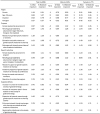Abstract
Background/Aims
The numbers of women, young doctors, and foreigners in the medical field have increased continuously. On the other hand, the environment for these minority groups has not improved, particularly in Eastern countries. The authors aimed to increase the awareness of the importance of a Diversity Committee in the Korean Society of Gastroenterology (KSG) by an analysis of a survey.
Methods
From January to February in 2019, a survey was conducted on physicians and a few medical students by googling. The questionnaire consisted of the target doctors of the Diversity Committee, purpose, specific activities, and expected effects of Diversity Committee to the KSG. The participants requested to respond with yes/no or a 5-point scale.
Results
A total of 202 participants completed the questionnaire, and 93.5% (189/202) were medical specialists. The proportion of males was 61.9% (125/202), and 39.6% (80/202) and 36.1% (73/202) participants were in their 30s and 40s, respectively. A total of 174 participants (86.1%) agreed with the necessity of a Diversity Committee, and 180 participants (89.1%) answered this committee would help advance the KSG with significant differences between males and females (80.8% vs. 94.8%, p=0.006; 84.8% vs. 96.1%, p=0.011). Similarly, there were significant differences in the responses according to sex in most questions.
Conclusions
Most participants of the survey expected a contribution of the Diversity Committee to the advancement of the KSG. On the other hand, in most of the priorities of the target, purpose, specific activities, and expected effects of the Diversity Committee, there was a difference in the perceptions between males and females. Therefore, continuous efforts are needed to reduce the differences within the KSG.
Figures and Tables
 | Fig. 1Survey responders about the target of a diversity committee compared to the sex differences. (A) Female. (B) Age <40 years. (C) Disabled. (D) Foreigner. The variables were compared using the linear-by-linear association test and a p-value <0.05 was considered significant. |
 | Fig. 2Survey responders on the purpose of the diversity committee compared to the sex differences. (A) Female leadership advancement. (B) Minority group leadership advancement (age <40 years, foreigner, disabled). (C) Research on gender-specific medicine or diversity. (D) Education and public relations on gender-specific medicine or diversity. (E) Exchanges with diversity committees of other academic institutions. The variables were compared using the linear-by-linear association test and a p-value <0.05 was considered significant. |
 | Fig. 3Personal and organizational factors can contribute to the success of new faculty. Adapted from Mehta and Forde14, with permission from Gastroenterology. |
References
1. Chair's message of SNU diversity council. [Internet]. Seoul: SNU Diversity Council;2018. 07. cited 2019 Apr 10. Available from: http://diversity.snu.ac.kr/page/greeting.php.
2. Inaugural forum: why diversity? [Internet]. Seoul: SNU Diversity Council;2016. 03. 28. cited 2019 June 3. Available from: http://diversity.snu.ac.kr/bbs/board.php?bo_table=forum_en&wr_id=1.
3. Carethers JM, Quezada SM, Carr RM, Day LW. Diversity within US gastroenterology physician practices: the pipeline, cultural competencies, and gastroenterology societies approaches. Gastroenterology. 2019; 156:829–833.

4. Women Gastroenterologist Support Committee, the Japanese Society of Gastroenterology. Nagoshi S, Shiotani A, et al. Career advancement of women in the Japanese Society of Gastroenterology (JSGE). Nihon Shokakibyo Gakkai Zasshi. 2013; 110:1387–1391.
5. Member organizations of Korea federation of women's science & technology associations. [Internet]. Seoul: Korea Federation of Women's Science & Technology Associations;2019. 05. cited 2019 Jun 4. Available from: http://www.kofwst.org/eng/organizations/status.php.
6. Underrepresented in medicine definition. [Internet]. Washington (DC): American Association of Medical Colleges;cited 2019 Apr 15. Available from: https://www.aamc.org/initiatives/urm/.
7. Kang SK, Kaplan S. Working toward gender diversity and inclusion in medicine: myths and solutions. Lancet. 2019; 393:579–586.

8. Association of American Medical Colleges. Women in U.S. academic medicine: statistics and medical school benchmarking 2003–2004. Washington (DC): Association of American Medical Colleges;2004. Table 1.
9. More women than men enrolled in U.S. medical schools in 2017. [Internet]. Washington (DC): Association of American Medical Colleges;2017. 04. 18. Available from: https://news.aamc.org/press-releases/article/applicant-enrollment-2017/.
10. Association of American Medical Colleges. Women in U.S. academic medicine: statistics and medical school benchmarking 2004–2005. Washington (DC): Association of American Medical Colleges;2005. Table 3.
11. Association of American Medical Colleges. Women in U.S. academic medicine: statistics and medical school benchmarking 2004–2005. Washington (DC): Association of American Medical Colleges;2005. Table 2.
12. The influence of women in medical circle has increased; a growing trend in women doctor and medical student. [Internet]. Seoul: Young Doctor Information, Inc.;2015. 04. 21. cited 2019 Apr 12. Available from: http://www.docdocdoc.co.kr/news/articleView.html?idxno= 173128.
13. Yedidia MJ, Bickel J. Why aren't there more women leaders in academic medicine? The views of clinical department chairs. Acad Med. 2001; 76:453–465.

Notes
SUPPLEMENTARY MATERIALS
Supplementary Fig. 1
Survey responders on the specific activities of the diversity committee compared to the sex differences. (A) Female leadership advancement program. (B) Minority group leadership advancement program (age <40 years, foreigner, the disabled). (C) Research support on gender-specific medicine or diversity. (D) Academic programs of gender-specific medicine or diversity at conferences. (E) Survey the needs and status of members. (F) Operation of the mentorship program. The variables were compared using a linear-by-linear association test and p-value <0.05 was considered significant.
Supplementary Fig. 2
Survey responders regarding the expected effects of a diversity committee compared to the sex differences. (A) Increase in the number of members on the society of gastroenterology. (B) Increase in manpower pool in future leaders on the society of gastroenterology. (C) Expansion of research areas through gender-specific medicine or diversity studies. (D) Enhanced network through exchanges with diversity committees of other academic institutions. (E) Resolving the imbalances in the society of gastroenterology. The variables were compared using a linear-by-linear association test and a p-value <0.05 was considered significant.




 PDF
PDF ePub
ePub Citation
Citation Print
Print





 XML Download
XML Download